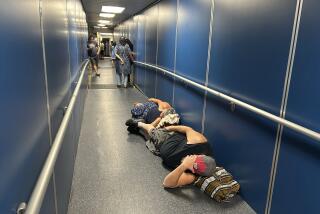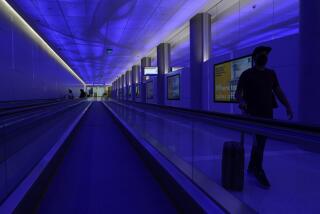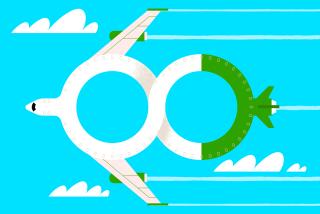High-Tech Messaging Smooths the Flight Path
- Share via
During a year in which aviation was as beleaguered as the Land of Oz, the wizards of the Web have been quietly pulling levers behind the screen to make high tech work for air travelers.
As a result, you can have your Aunt Alice in Des Moines paged when your plane is late, do your own check-in at self-service airport kiosks, rebook your flight from your PDA and print your own boarding pass.
For a happy beneficiary of these developments, I offer you Paul Romaninsky, a consultant who was on his way home to Charlotte, N.C., from San Jose on Nov. 29 after a business trip. He had bought his United ticket through Orbitz (www.orbitz.com), an Internet site that is owned by several airlines.
While waiting to board his connecting flight at Chicago’s O’Hare airport, “I received a call on my cell phone from a guy named Sam from Orbitz who told me my flight had been canceled,” Romaninsky recalls. “So Sam said, ‘Here are your options: They’ve scheduled you to catch the next [United] flight for Charlotte,’” which was about two hours later, but Romaninsky wanted to leave sooner. So Sam found a US Airways flight leaving an hour later and talked Romaninsky through the process of getting United to endorse his paper ticket and track his luggage.
“If it weren’t for him, I never would have caught that plane,” Romaninsky says.
Romaninsky had signed up for “Care Alerts,” a program Orbitz began in June that, as of early this month, covered about 70% of its customers and sent out messages to some 30,000 people a day. They can choose to be messaged automatically by e-mail, cell phone, pager or PDA (personal digital assistant) when their flights or even gates change.
A fortunate few, like Romaninsky, get a phone call “in special circumstances ... in which we need to get someone quickly” or if an automated message fails to go through, a spokeswoman says. Orbitz gets its up-to-the-minute data from the airlines’ flight operations centers, chief marketing officer Roland Jacobs says. The Internet travel site Virtually There, www.virtuallythere.com, and several airlines have begun similar programs this year; Travelocity, www.travelocity.com, has offered paging for years.
The rush to wire up customers seems to have at least two motives: savings and service.
“It’s not an altruistic move by the airlines,” says Henry Harteveldt, a senior analyst with Forrester Research. “Airlines like it because it takes people out of lines.” Think banks in the days before automated teller machines: the more self-service, the fewer employees needed.
High tech is also popular with customers, Harteveldt notes. About 17% of travelers say they used self-service check-in kiosks at airports in the last year, he says. And about half to 85% are using e-tickets, according to the airlines I contacted.
American Airlines spokesman Gus Whitcomb agrees with Harteveldt, in a more corporate-speak way. Although self-service “might be saving us money,” a major consideration is “people who want control of their destiny at the airport,” he says. And when customers generate their own answers to routine queries, service representatives are freed up to handle more complex questions, he adds.
Meanwhile, one refuge of technophobic travelers is fast disappearing: the city ticket office, or CTO in industry slang, where you can walk up to a satellite airline counter in your neighborhood and conduct business face to face. Among cutbacks this year: American closed 100 CTOs, leaving just six in the U.S.; Delta shut 37 of 70 sites; and United shut 32, leaving 55 in North America.
And if you insist on a paper ticket, you may have to pay for it. This year, American and Continental added a $10 fee to issue a paper ticket on routes where e-ticketing is available, and Alaska Airlines raised its fee to $20 from $10. As of early December, the six other major U.S. airlines--America West, Delta, Northwest, Southwest, United and US Airways--didn’t charge a fee.
Here are some of the developments in the world of high-tech flying. I’m confining the list to the nine major U.S. airlines and some Internet companies for brevity’s sake, even though foreign carriers are also active in this arena.
* Paging. Most of the major airlines now have programs that notify customers if their flight is canceled or delayed or the gate is changed. You can register on the airline’s Web site; in some cases, only frequent fliers get the service.
The way the automated message is delivered also varies. Text messages may go to pagers, PDAs, text-enabled cell phones or regular e-mail; voice messages may go to cell or other phones.
At least three airlines added paging this year. United, which began paging in 2000, introduced a unique feature this year: Instead of having to register for the service each time you book a flight, you can register just once.
Orbitz will send text messages not just to you but to others in your electronic address book who may be awaiting your arrival. (Some airlines offer this, but you generally must register each person.)
* Internet and wireless check-in. You can check in for your flight through the Internet on Alaska (since 1999), Northwest (since 2000) and, new this year, Delta (frequent fliers only). The service was briefly suspended in some cases after Sept. 11.
Northwest also has begun letting some of its customers rebook flights on the Web or on wireless devices such as PDAs. You can also check in and pay the change fee, if any, on the Internet or at the self-service kiosk at the airport, bypassing the ticket counter.
* Self-service kiosks. Most of the majors also provide computer kiosks at airports where you can check in for your flight. Alaska and Continental are ahead of the pack in installing the units. As of early December, Alaska was operating these in 72 of the 75 U.S. airports it uses, and Continental at 87 of 122.
Kiosk customers with baggage to check generally must still go to the ticket counters or use curbside check-in. But in Portland, Ore., you can use Alaska Airlines’ kiosks to print out your baggage tags and attach them yourself. (All bags are scanned, an Alaska spokesman says.) United has phones in its kiosks that let you contact reservation agents.
* Online award travel. Frequent fliers achieved a small but welcome victory this year when Alaska, American, America West and Delta began letting them book award travel online; Northwest and United already allowed it. Previously, customers could redeem the miles online but then had to call or send an e-mail to book the trip.
*
Jane Engle welcomes comments and suggestions but cannot respond individually to letters and calls. Write Travel Insider, Los Angeles Times, 202 W. 1st St., Los Angeles, CA 90012, or e-mail jane.engle@latimes.com.
More to Read
Sign up for The Wild
We’ll help you find the best places to hike, bike and run, as well as the perfect silent spots for meditation and yoga.
You may occasionally receive promotional content from the Los Angeles Times.






